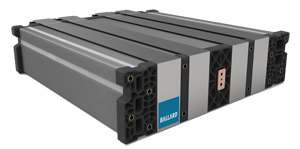Despite the state’s resistance to renewable investments, an energy shift is palpable in Texas. Ballard Power Systems is redrawing the energy landscape by installing a colossal 3-gigawatt fuel cell factory, propelling the state towards a greener mobility future.
Ballard’s Advent into Texas: More Than Just Cars
In an intriguing turn away from traditional vehicle manufacturing, Ballard Power Systems, a Canadian firm known for its clean energy solutions, is championing zero-emission transportation. Rather than producing cars, this new factory is set to manufacture fuel cells for an array of large vehicles, including buses, trucks, and even locomotives.
Strategically choosing its factory locations based on customer geography, Ballard has pinpointed Texas as a critical site for its operations. The Rockwall Technology Park in Rockwall, Texas, provided by the Rockwall Economic Development Corporation (REDC), has enticed Ballard with a compelling offer, combining land, financial advantages, and helpful assistance throughout the planning process.
Though some bureaucratic obstacles remain, should things continue smoothly, the factory is poised to launch full operations by 2027. The company’s plan is ambitious, aiming to generate vast quantities of fuel cell components and presenting options for future expansion and even more significant production capabilities at the Rockwall location.
Government Entities Rally Behind Ballard’s Vision
The REDC is not the lone cheerleader in this clean energy endeavor. The U.S. Department of Energy (DOE) also perceives fuel cells as pivotal in the energy transition and has recommended Ballard for two sizable grants aiming to refine its manufacturing capabilities, with the potential to elevate the fuel cell industry and lower the cost of green hydrogen production.
These grants, which are a portion of a broader $750 million program initiated by the Bipartisan Infrastructure Law, could deeply enhance Ballard’s manufacturing systems, particularly in achieving high-throughput production. There’s further financial support on the horizon, with the Internal Revenue Service offering Ballard a substantial investment tax credit for this new factory.
The Emission-Free Promise of Fuel Cell Electric Buses
Fuel cell buses are at the forefront of sustainable transport, presenting an alternative route to decarbonization with no airborne tailpipe emissions—the only byproduct being water. However, the challenge lies in the hydrogen supply chain, which is currently bound to less-sustainable natural gas and coal gasification processes. Despite this, experts foresee a future where abundant renewable energy sources could dramatically reduce green hydrogen production costs.
The DOE is actively investing in the future of low-cost, sustainable hydrogen with its “Regional Clean Hydrogen Hubs” initiative, pumping billions into the creation of these hubs and emphasizing the transition to green hydrogen—even as the hydrogen supply chain remains a highly contested battleground.
The Ongoing Love Affair with Texas’ Fuel Cell Future
Amid further electrification efforts, Texas’s transportation corridors are becoming prime candidates for hydrogen refueling infrastructure, particularly within the interstate highway system. This infrastructure integrates seamlessly with Texas’s ambition to excel in renewable energy, touting its existing wind and solar assets.
Despite some political reluctance, Texas continues to draw substantial green hydrogen investments. Projects like Hydrogen City and foreign interests from companies like INPEX highlight the state’s potential as a powerhouse for green hydrogen and ammonia production. Moreover, industry giantslike Ørsted are betting on Texas’s green hydrogen to revolutionize offshore operations with synthetic fuels.
In a cultural and technological shift that aligns with global decarbonization goals, Texas’s new fuel cell factory spearheaded by Ballard Power Systems may well catalyze an energy revolution within a traditionally fossil fuel-oriented landscape.

























